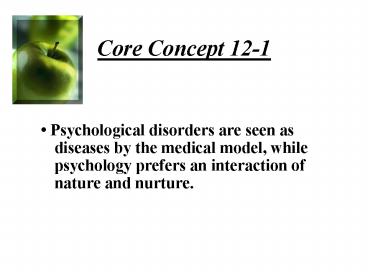Core Concept 121 - PowerPoint PPT Presentation
1 / 34
Title:
Core Concept 121
Description:
Pattern of emotions, behaviors, or thoughts inappropriate to the situation and ... irrationality. unpredictable behavior. unconventional behavior. Core Concept 12-2 ... – PowerPoint PPT presentation
Number of Views:44
Avg rating:3.0/5.0
Title: Core Concept 121
1
Core Concept 12-1
- Psychological disorders are seen as diseases by
the medical model, while psychology prefers an
interaction of nature and nurture.
2
Psychopathology
- Pattern of emotions, behaviors, or thoughts
inappropriate to the situation and leading to
either personal distress or inability to function
effectively - Also called
- mental illness
- mental disorder
- psychological disorder
3
Normal v. Abnormal
- Telling the difference not easy.
- Abnormality is relative and varies with both
historical time and culture. - Severe psychological disorders easier to identify.
4
Hallucinations
- False sensory experiences
- Example hearing the voice of God giving commands
to behave in bizarre fashion
5
Delusions
- Disordered thinking involving persistent false
beliefs - Examples persecution or grandiosity
6
Severe Emotions
- Depression
- Mania
- Lack of all emotions
7
Continuum of Psychopathology
- _____________________________
- None Mild Moderate Severe
8
Neurosis v. Psychosis
- Outdated but useful concepts
- Neurosis--unhappy and ineffective but not out of
touch with reality or dangerously ill. - Psychosis--profound disturbance in perception,
rational thinking, and emotions.
9
History of Mental Illness
- Ancient World--mind possessed by demons and
spirits. - Hippocrates (400 B.C.)
- abnormal behavior due to physical causes
- began the medical model of mental illness
- Imbalance of four body humors
- Middle Ages--devil and witchcraft again
- Medical model returns in 18th century
10
Ancient World
- Explanation of psychopathology- mind possessed
by demons and spirits
11
Hippocrates
- Psychopathology due to physical causes
- Began the medical model of mental illness
- Imbalance of body humors
12
Body Humor Theory
13
Middle Ages
- Devil and witchcraft again used to explain mental
illness - Cure was torture--drive out the devil.
14
(No Transcript)
15
Ergot
- A fungus that infects rye grass
- Contains lysergic acid (like LSD)
- Hallucinogenic
- Salem witches likely affected by ergot
16
Medical Model
- Returns in 18th Century
- Diseases of mind have medical causes
- Led to sweeping reforms in treatment of mental
illness
17
Insane Asylums
- Humane treatment based on rest, contemplation,
and simple work. - Became overcrowded warehouses
18
Problems with Medical Model
- doctor-knows-all leads to passive patients
- over reliance on drug therapy
- no increase in coping skills
19
Psychological Models
- Behavioral-abnormal behaviors learned
- Cognitive-abnormal behaviors influenced by how
people think of themselves and others - Social-abnormal behavior occurs in a social
contex - Biological-genetic factors and brain dysfunction
contribute
20
Indicators of Abnormality
- distress
- maladaptiveness
- irrationality
- unpredictable behavior
- unconventional behavior
21
Core Concept 12-2
- The DSM-IV, the most widely used system,
classifies disorders by their mental and
behavioral symptoms.
22
Classification of Disorders
- Diagnostic and Statistical Manual-Fourth Edition
(DSM-IV) - Classifies disorders by mental and behavioral
symptoms - Widely accepted
- More than 300 disorders
23
Classes of Disorders
- Mood Disorders
- Anxiety Disorders
- Schizophrenic Disorders
- Personality Disorders
- Many others
24
Mood Disorders
- Abnormal disturbances in emotion or mood, also
called affective disorders. - Major Depression
- Bipolar Disorder
25
Depression
- Lifetime risk of 5.2 of having a depressive
episode. - Major Depression--extreme sadness, loss of
enjoyment, sleep and appetite problems, loss of
energy, difficulty concentrating, thoughts of
death. - Dysthymia--mild depression
26
Bipolar Disorder
- Alternating periods of mania and depression.
- Manic Phase--euphoric, energetic, hyperactive,
talkative, and excited. - Usually responds well to medication.
27
Schizophrenia
- A psychotic disorder involving distortions in
thoughts, perceptions, and emotions. - Incidence of 1 with first episode almost always
in late adolescence or early adulthood. - State psychiatric hospitals--40 of patients have
schizophrenia.
28
Disorganized Type
- Incoherent speech
- Hallucinations
- Delusions
- Bizarre behavior.
29
Paranoid Type
- Delusions of persecution or grandiosity
- Hallucinations
- No incoherence
- Withdrawn
- Flat affect
30
Personality Disorders
- Not a mental disorder
- A long-standing personality pattern
- Leads to maladpative behavior, disrupted social
relationships, poor impulse control. - Very chronic, pervasive, inflexible.
31
Examples
- Narcissistic--feels entitled, needs constant
attention or admiration. - Borderline--very unstable patterns.
- Antisocial--pattern of irresponsible behavior and
lack of conscience.
32
Core Concept 12-3
- Ideally, accurate diagnoses lead to proper
treatments, but diagnoses may also become labels
that depersonalize individuals and ignore the
social and cultural contexts in which their
problems arise.
33
Labeling People
- Ideally,diagnosis may become a label with
negative consequences--a stigma. - Rosenhan Study of pseudopatients
34
Insanity Plea
- A legal not psychological concept--person found
not guilty by reason of insanity is not held
responsible for their criminal conduct. - Myths about the insanity plea abound.
- In Texas, a severe mental disorder that prevented
the person from knowing right from wrong.





























![Who was this Donald Lee, the man who set power free? And, was there a "secret to his method", so to speak? [File 4 of 5] PowerPoint PPT Presentation](https://s3.amazonaws.com/images.powershow.com/9270440.th0.jpg?_=20190520016)

